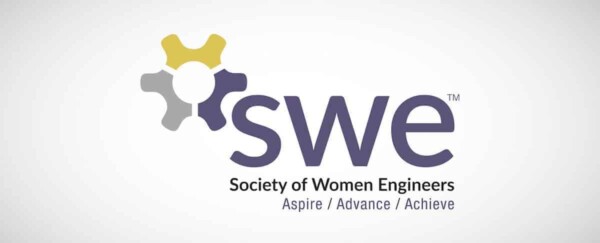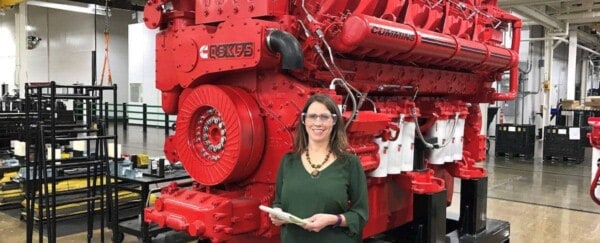Sonya Benson, associate principle engineer at PepsiCo, was invited to participate in the Society of Women Engineers’ Diverse podcast series, which supports the advancement of women in engineering and technology.
Listen to the podcast to learn:
- What led Sonya to develop a passion for polymer science.
- What packaging work she is most proud of at PepsiCo.
- How she’s used her scientific background to support the work of PepsiCo’s Food for Good program.
Welcome to Diverse, the podcast of the Society of Women Engineers. SWE supports the advancement of women in engineering and technology. You can find all of our podcasts on SoundCloud, iTunes, and SWE’s blog, All Together, at AllTogether.swe.org.
(Penny)
Hi, I’m Penny Wirsing, FY19 President of the Society of Women Engineers, and this is SWE’s Diverse podcast.
Joining me now, as part of our Women Executives in Engineering Series, is Sonya Benson. She is an Associate Principle Engineer at PepsiCo, and she has a Ph.D. in Macromolecular Science and Engineering.
Thanks for joining us Sonya.
First, tell us about your educational background.
(Sonya)
I have a bachelor’s in Chemistry from Baylor University. I think studied polymer science at the University of Southern Mississippi, then earned my Ph.D. in Macromolecular Science and Engineering from Virginia Tech.
(Penny)
Very impressive credentials. I’ve heard you mention you have a passion for polymer science. How did you become interested in polymer science?
(Sonya)
Upon competing my bachelor’s degree, I knew that I wanted to go to graduate school, but I really wasn’t sure what I wanted to study, so I decided to go out into industry with the intent on trying to figure it out there. The first job that I had was with the synthesis of polystyrene, and with that position I really got to understand how macromolecules are created and really got interested there. After that career experience, the next one that I had was centered around blending polymers with different components to created blends for different applications. I was just really interested in how the arrangement of molecules influences the final properties of a material.
(Penny)
Sonya, I understand you joined PepsiCo after earning your Ph.D. Can you tell us about your career there?
(Sonya)
Yes, I’ve been with PepsiCo for seven and a half years. I have really worked on a diverse range of projects most of them with a strong focus on environmental sustainability. Some of my first work here was focused on introducing solar panels to the Frito-Lay Fleet Team to extend the life of the batteries for route trucks in urban environments. I’ve also worked on creating mobile vending platforms that utilize solar power and low-cost refrigeration methods as well for emerging markets. Some of my packaging work that I am most proud of was working on next-generation bio-based polymer blends for thin-film snack packaging applications.
(Penny)
As an environmental engineer myself, I really appreciate the environmental focus you’ve had in some of the past projects and it’s great that you’ve worked on such a variety of projects and pursued some of your passions, too. I’m sure young women who want to make a difference would be interested to hear about your work fighting childhood hunger with the Food for Good program.
(Sonya)
Yes, that’s really been a wonderful program to work with. I’ve really had the opportunity to work with a great team of professionals in this program. This program was started back in 2010 I believe. It started here in Dallas actually with the goal of utilizing PepsiCo’s expertise in packaging and logistics in moving food from one location to another to help address some of the needs in terms of access and affordability to kids that normally get free lunch during the school year. So, what we did with this program is look at what was needed from a delivery standpoint utilizing a refrigerated truck to get the food from the packing location to the children at the various sites was really costly and not sustainable. What we did was develop a low-cost what I call a refrigerator using some very interesting materials in order to create something that really didn’t require us to use a refrigerated truck anymore. Since the development and implementation of that solution, the program has been able to grow considerably. So, it’s not just in Dallas, it’s across the U.S. now. We’re even looking at going international.
(Penny)
Wow, and I understand that the Food for Good Program is in partnership with USDA and Feeding America, so it really has far-reaching effects.
(Sonya)
It does. It’s just really exciting what you are able to do with your technical skills in fighting some of these issues.
(Penny)
It’s truly an example of how engineers solve problems to make the world a better place.
(Sonya)
Yes.
(Penny)
I didn’t realize how much packaging is integral to Pepsi’s business. I see on the website that there really is an extensive array. Tell us more about packaging process and how engineering is involved in that.
(Sonya)
Yes, so we have primary packaging where the product is in direct contact with the package, so it may be actual bag and then you have other levels of packaging as well. With my projects, I’ve been able to touch the primary package, where you’re looking at the materials, some multi-component structure, a multilayer. So, there is more than one type of plastic in that bag that you see on the shelf in the store…looking at the way that those packages fit within a box that goes onto the back of a truck, how those boxes fit efficiently on the truck, and the transportation process. Now, what we are really focusing on more than ever before is the entire life cycle of the package and PepsiCo has a sustainability goal for 2025 that 100% of our packaging will be either recyclable, compostable, or biodegradable.
(Penny)
That’s very impressive, and again as an environmental engineer, I truly appreciate it. I understand that you also do some demonstrations about packaging for Girl Scouts?
(Sonya)
I do. That’s something that I really look forward to. I have an opportunity to do that two or three times a year. The Girl Scouts come to Frito-Lay headquarters and they take a tour and are able to interact with various parts of the business. Part of that is packaging, so I share with them the materials we use to make up a bag, how those materials are put together. I also talk about all the modification that has to be made in order to print on the film. I really try to give them an idea of some of the technical challenges we face while I’m showing them the different components that go into the structure.
(Penny)
That is a fabulous opportunity to really help young women understand what engineers can do.
I understand you live in Texas and grew up in Fort Worth. Tell us about your family and work/life balance.
(Sonya)
I’m a native of Texas. I’m a mom of four, ages 17 all the way to one.
(Penny)
Congratulations.
(Sonya)
Thank you.What is important for me, the balance does need to be there. I enjoy spending time with them and I’m really happy to be a part of a corporate culture where work/life balance is really promoted. I have some flexibility to work at home when needed. One of things that I do like about being here in Texas is that I am close to family and so I can tap into my village and my network here when I’m traveling.
(Penny)
That is important. Do you have any advice for young women interested in engineering and trying to decide what discipline to pursue?
(Sonya)
I would recommend that you ask questions, lots of questions, then recognize that there are people always will to help at every level. Take advantage of the resources you have a school. Talk to your counselors. Talk to your parents. Also, reach out to organizations such as SWE that may be an excellent opportunity for you to ask questions of its members and see if there are any programs at colleges and universities. A lot of times there are summer programs where you can take classes and also do research and to get exposure as well. I believe that exposure is the key and to do that as often as possible.
(Penny)
Thanks for that call out to SWE. Yes, SWE does offer a lot and I appreciate it, and I know that PepsiCo is also involved in the programs that can help influence young women as well. I would just point out that folks can visit PepsiCo.com for more information on Food for Good and some of the other initiatives that we’ve talked about. Sonya, is there anything else that you’d like to add?
(Sonya)
I think there is. You asked me earlier about what is involved in packaging and one of the things I forgot to mention is that I am part of a very cross collaborative team with a number of the projects that I have. So, learning how to communicate with people outside of the engineering team is really important as well so being a part of a team that includes finance, that includes marketing insights, the sales force, is really important to delivering the packaging innovations that you see on the shelves. Learning how to be part of team is really important to your success.
(Penny)
Absolutely. Thanks for pointing that out. Sonya, thank you so much for joining us. Sonya Benson is an Associate Principle Engineer at PepsiCo.
I’m Penny Wirsing. For all of us as SWE, thanks for listening.
Listen to more podcasts in our Women Executives in Engineering Series.
Author
-

SWE Blog provides up-to-date information and news about the Society and how our members are making a difference every day. You’ll find stories about SWE members, engineering, technology, and other STEM-related topics.






